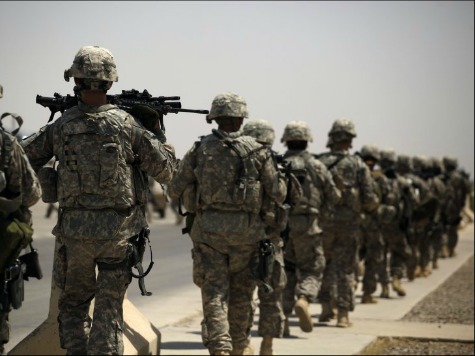President Obama on Sunday said the deployment of 1,500 additional American soldiers to Iraq signals a “new phase” in the U.S.-led fight against Islamic State jihadists, one that will help Iraqi forces go on the offensive.
On Nov. 7, Pentagon Press Secretary Rear Adm. John Kirby told reporters that the deployment of the additional troops, which will nearly double the number of U.S. forces already in Iraq, is contingent onCongress approving $5.6 billion in funding.
“Phase one was getting an Iraqi government that was inclusive and credible, and we now have done that,” Obama explained to CBS’s “Face the Nation” host Bob Schieffer on Nov. 9.
“Rather than just try to halt [the Islamic State’s] momentum, we’re now in a position to start going on some offense,” added the president.
Obama said his approval of sending more forces to Iraq is not a sign that the U.S.-led strategy against the terrorist group is failing.
The new troops would serve as non-combat advisers who will aid Iraqi forces in going on the offensive against the Islamic State (IS, also known as ISIS and ISIL), according to Obama.
“It’s beingdone now, quite frankly, because the Iraqis havedemonstrated the willingness and the skill to go after ISIL,” Kirby told reporters when asked to assure the American public that the decision to dispatch more forces has nothing to do with the recent midterm elections.
“So they’vereached a point where they need additional help and guidance,” he added.
A U.S.-led coalition has been attacking ISIS militants from the air since early August. Airstrikes against the Islamic extremists started in Iraq and were later expanded to Syria.
That has helped the Kurdish ground forces currently fighting the jihadists in Iraq and Syria.
“Now we need Iraqi ground troops to start pushing [ISIS] back,” said the president during the CBS interview. “The air strikes have been very effective in degrading IS’s capabilities and slowing the advance that they were making,” he asserted. “Now what we need is ground troops, Iraqi ground troops, that can start pushing them back.”
Obama did not rule out sending more troops saying,”You know, as commander in chief, I’m never going to say never.”
However, he said that members of the U.S.-led coalition against ISIS will be making contributions to the mission, which could reduce the number of the American forces that would be needed.
On Nov. 7, the Pentagon explained, in a statement, that the additional soldiers will deploy “over the coming months, in a non-combat role, to expand our advise and assist mission and initiate a comprehensive training effort for Iraqi forces.”
The additional forces would help train nine Iraqi army brigades and three Kurdish Peshmerga forces brigades.
Defense Secretary Chuck Hagel “made this recommendation to President Obama based on the request of the Government of Iraq, U.S. Central Command’s assessment of Iraqi units, the progress Iraqi security forces have made in the field, and in concert with the development of a coalition campaign plan to defend key areas and go on the offensive against the Islamic State of Iraq and the Levant (ISIL),” added the statement.
The Government of Iraq will help the U.S. fund the training, but Kirby told reporters he would not characterize Iraq’s contribution as covering the bulk of the expenses.
“The training will be funded through the request for an Iraq Train and Equip Fund that the administration will submit to Congress as well as from the Government of Iraq,” said the Pentagon in the statement.
“Ultimately, these Iraqi forces, when fully trained, will enable Iraq to better defend its citizens, its borders, and its interests against the threat of ISIL,” it added. “This effort is in keeping with our overarching strategy to work with partners on the ground to destroy ISIL.”
Breitbart News reported that there was no communication between Obama and the Pentagon concerning a strategy to fight ISIS before the United States started bombing the terrorist group in early August.
Kirby said most of the troops in the advise and assist part of the mission would be serving as force protection personnel, which carries risks.
Of the 1,500 additional forces, less than half will be dedicated to the advise and assist mission, according to Kirby.
Those forces will also be responsible for logistics as well as command and control duties.
The Pentagon press secretary insisted that U.S. forces will not be serving in a combat role.

COMMENTS
Please let us know if you're having issues with commenting.